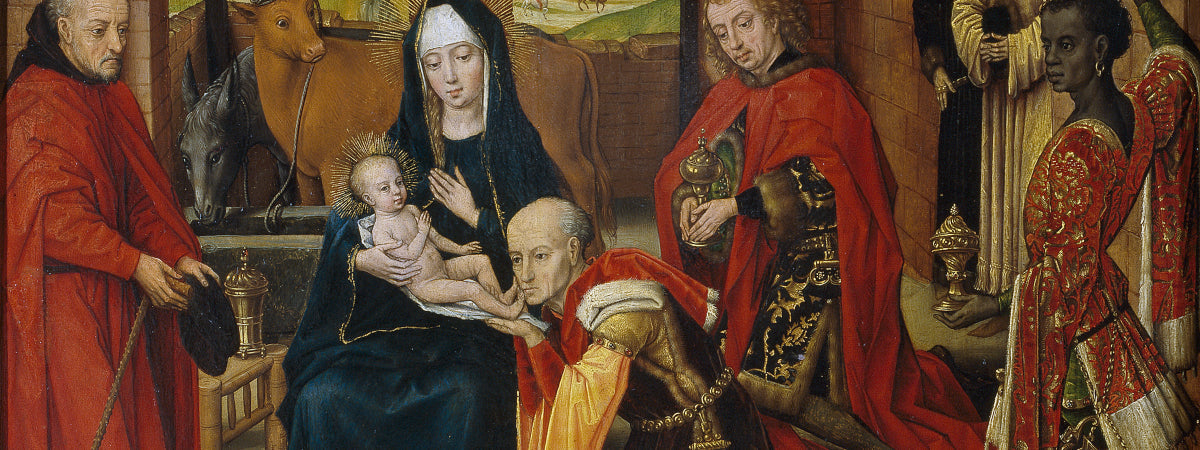Have you ever encountered a stranger in need who asks you for money? A homeless person on the sidewalk downtown? An unemployed veteran in a wheelchair, soliciting funds from passers-by? Someone standing at a stoplight with a cardboard sign asking for help?

These encounters pierce our hearts, or at least, they should pierce our hearts, if we are living our Faith and aspiring to the virtue of charity. How should we, as Catholics, respond to these pleas for help from our brothers and sisters in Christ?
Encountering Poverty
Sometimes families wait in the parking lot of my family’s parish until Mass has ended, soliciting donations from parishioners as they exit the church. Often they have children accompanying them. A few months ago, a family like this was in the parking lot of our parish. One of the children, a little girl about five years old, held a sign that said, “Need help to feed my family. No job. Three Children. God bless you.”
Ours is a very large and generous parish, and our pastor is very devoted to the poor. After Mass that day, he asked parishioners not to give money to the families we see outside the church. He explained that the police had contacted area churches to say sometimes these are scams. There were people working to make thousands of dollars this way, going all over town to churches on Sundays.
In order to prevent them from taking advantage of parishioners, our pastor had found a way for the parish to help families that were truly in need. He explained that one of the priests always approaches these families, offering help and asking to meet with them immediately to determine their needs.
Monsignor assured us that the parish would do everything it could to take care of these people after talking to them and understanding how they could help. He even told us that he had approached the particular family in our parking lot that Sunday, offering to give them what they needed if they told him what that was. But the family did not want to meet with him or talk to him, he said.
Still, it felt terrible to walk by as they stood at the door to the church after Mass was over. It was gut-wrenching to see the little girl holding the sign, asking for help, saying “God bless you,” as people passed her.
How do we as Catholics treat the poor, especially when we encounter them in person?
It can be agonizing when we are confronted with such desperation and need. And it should be.
If one of your kindred is in need in any community in the land which the LORD, your God, is giving you, you shall not harden your heart nor close your hand against your kin who is in need. Instead, you shall freely open your hand and generously lend what suffices to meet that need.
—Deuteronomy 15:7-8

What Does the Church Teach?
The Church teaches us that almsgiving is a crucial foundation of Christian charity. While we are under no formal obligation to give directly to every person we may encounter, we should give generously of our time, talent, and treasure to our parishes for use by ministries and organizations that serve the poor. We can do this by donating to our parishes and diocesan support appeals. We can also donate directly to charitable organizations we know and trust. This type of organized giving is a simple and trustworthy way to consider and aid the plight of the needy. It is an admirable means of charity.
[[mother-teresa-small-things-quote-mug, 31359]]
We can help in many ways beyond monetary donations by volunteering our services and time and praying conscientiously for those in need. There is always something we can do, even if we cannot afford to donate money. What is important is to do what we can.

Catholics are not canonically obligated to give a certain percentage of our income to the poor, though many choose to tithe. Tithing was an obligation of the Jewish people under the Law of Moses. The Scriptures tell us that the law directed all Jews to give ten percent of their wealth to the Lord. While we are under no obligation to give exactly ten percent, we are called, by virtue of our Christian faith, to help the Church and the needy in our own communities and all over the world. This call is a direct message from Our Lord in the Gospels.
What About Face-to-Face Encounters?
But what about giving to people on the street corner who are in need? This type of giving is more controversial, and likely to stir conflicting emotions in different people. Some believe that giving to individuals on the streets is unsafe or supports a lifestyle of panhandling by failing to encourage people to help themselves. This may be true. And yet some of these people may not be able to help themselves. Not everyone has a place to shower, clean clothes to wear, or transportation by which they can apply for a job and climb out of poverty. Not everyone is well enough, or fit enough, to know how to do so.
Some people believe it is best to defer to established channels of support where these brothers and sisters in Christ can receive the services and funds they need. While this may be true in particular situations, not all of those in need can drive across town to a shelter or soup kitchen for a bed or a meal. Not everyone has an address or phone number by which someone can contact them to discuss employment. Sadly, many poor people are so weary from the trials of their lives that it is too daunting to consider requesting assistance from an agency or a large organization. Those who are mentally ill are often incapable of asking for help in this way.
Give to the one who asks of you, and do not turn your back on one who wants to borrow.
—Matthew 5:42

When the Lord spoke these words, He did not say that we should first determine who was honest, or whose situation was more worthy of the gift. It is tempting to think to ourselves—when we see someone begging while drinking something out of a brown paper bag—“If I give him this money, he will use it for alcohol.” That may be true. If we want to give freely in this type of situation, we have to accept that the gift is our loving response to his need; and what the recipient does with the gift is out of our control. It’s up to him. That is one reason why many people feel uncomfortable with transitory giving.
Isn’t it interesting, though, that our hearts go to this place of judgment? It is human nature. Yet surely there have been times when we spent our money carelessly or on luxuries—things we did not need, things that others might find inappropriate for our circumstances.
While direct giving can be difficult, it can also be an exercise in our own humility. Through it we come face to face with the inadequacy of our response to our brothers and sisters in Christ.
On the other hand, we don’t always feel that we can respond immediately to the need in front of us by this kind of giving. The Church invites us to consider for ourselves what we feel we can and should do when encountering a specific need.
[[the-imitation-of-christ-with-zippered-cover, classic-art-prayer-card-set]]
Waiting on a Traveler
A few weeks ago, my mother called me to tell me she had met a man in the parking lot of a shopping center who asked her for money. He said he was traveling home from the hospital with his wife, had run out of money, and needed some to buy gas. The man appeared to be alone. My mom did not ask to see the car, or the wife. She told the gentleman she would meet him at the gas station in this same shopping center, a short walk away, where she would pay for him to fill his tank with gas. My mother drove to the gas station, parked her car, and waited. The man never arrived.
She felt so sad for him, and so sorry for his plight, that she waited twenty minutes for the traveler, wondering why he did not show up. Eventually she left. When she called me, feeling badly about the situation, I told her: “If he had truly needed that gas he would have met you at the gas station. It’s in the same parking lot. He could have walked there easily in less than a couple of minutes. You didn’t do anything wrong in leaving. You tried to help. God knows our hearts. Be at peace.” Together, we agreed to pray for him.
Sometimes people lie. They try to take advantage of a person or a situation. Sometimes they do not truly need something—they merely want something. They prey on the compassion and generosity of others. They manipulate circumstances for their own good, regardless of the consequences. Sometimes there may be other ways to obtain things, but they are not interested in pursuing those. They do what is easiest and what requires the least of them.
Does any of this sound familiar? How many times have we behaved similarly with God? Treating what we have as entitlement; failing to appreciate it; manipulating circumstances or rationalizing our own actions and behaviors; choosing a way to achieve something that may not be the most prudent or honest. We may be selfish in certain situations; imprudent with our money or decisions in others. We may cause others to suffer our own through dishonesty or cruelty. In a certain sense, we have all been “that traveler” who approached my mother.
I thought of the Lord and the Tabernacle when my mother told me her story. Jesus has already given all of Himself. He waits. The God of the Universe does not hold back His gifts. He gives regardless of our ingratitude or behavior, and He waits. We may fail to see it, appreciate it, or thank Him for it. We may drive past the church numerous times a day without even acknowledging the Real Presence. We may fail to spend a few minutes in prayer because we think we don’t have time. Yet He is there, waiting to be loved. The incredible mercy of God!
In the poor, let us see ourselves, as Jesus sees us. His sacrifice and death on the cross created a place for us in heaven. Now we must respond to His gift accordingly. He has given. What do we do with His gifts? He still gives, regardless. He cannot deny what He is. Sometimes our responses are less than ideal. They are spiritually impoverished. We squander His gifts and fail to realize it.
When my family is in the car and we see people asking for help, we sometimes roll down a window and give the person a bottle of water, a granola bar, or money. Sometimes we keep water bottles and granola bars in the car just for this purpose. When we reach out to them from the window, we look them in the eye, hand them the gift, and say, “God bless you.” Then we pray for them together.
Long ago, my kids and I started saying a prayer in each of these circumstances, asking for Our Lady’s help. After all, she is their mother, and they are her children, just as we are. This is the prayer we say:
Mary, Our Mother, look down upon your child in need and provide whatever they need to live in dignity. Bring into their lives the right people to help them find the right resources. Be with them to guide, guard, and protect them. Never lose sight of your child’s great needs. Amen.
Recently, my son and I passed one such person standing at an intersection holding a sign asking for money. As we drove by, with the man standing on the median, my son asked, “Mom, does it hurt for you to look them in the eye? Because it hurts me.”
“Yes, it does,” I said, “but we do it anyway. That’s what makes it love. Let’s pray our prayer.”
How Do We Live It?
Our Faith calls us to love others—most especially those who are suffering and in need. How easily we can come to believe our lives are “too busy” to love others in this way! We become so absorbed with our own day-to-day lives that we are not as sensitive as we should be to the needs of the poor.
Take time. Make time. Give financially, serve a ministry, volunteer in the community, take a mission trip, pray for the poor who are our brothers and sisters in Christ and do not have what they need to live in dignity.

So I thought it necessary to encourage the brothers to go on ahead to you and arrange in advance for your promised gift [donation], so that in this way it might be ready as a bountiful gift and not as an exaction. Consider this: Whoever sows sparingly will also reap sparingly, and whoever sows bountifully will also reap bountifully. Each must do as already determined without sadness or compulsion, for God loves a cheerful giver. Moreover, God is able to make every grace abundant for you, so that in all things, always having all you need, you may have an abundance for every good work.
—2 Corinthians 9:5-8
When you meet an individual in need, face to face, remember that this is an encounter. In it, you encounter your own humanity, and theirs; your own dignity, and theirs. Look them in the eye. Bring Christ to them there.
If you choose to give them something, give your gift freely and generously, without wondering how it will be used. Whether or not you give, you can always pray for them.
Regarding Jesus’ words that the poor will always be with us: this is a fallen world and we are selfish creatures. We can aid poverty, but we will not permanently eliminate it.
In the car that day, my son asked, “Mom, why does God allow people to be poor?”
I answered, “We can never know the mind of God, but there is one thing that I know is true about the existence of poverty: the poor exist for us to love them.”
In helping the poor, we actualize our faith. We live it. We imitate Christ. Not many of us in today’s world are called to die for others in the way that Jesus died for us. But we can die to self. One generous way to do that is to give to the poor.
We must never be complacent in the face of human suffering. Jesus wasn’t. And believe it or not, material poverty is not the most terrible kind. To lack the material goods necessary to live in dignity is indeed a very great suffering—but to lack compassion for the poor is to be spiritually impoverished, and that is a far greater tragedy.
What can you do for the poor today, whether financially, or through prayer and sacrifice?
Do you have a story to share about a personal encounter in which you saw Christ in a needy person?
Share your thoughts with us in the comments below!
























